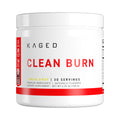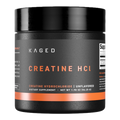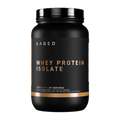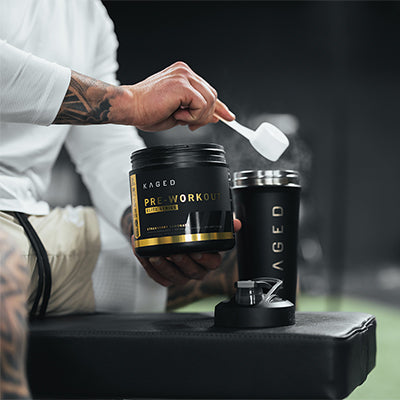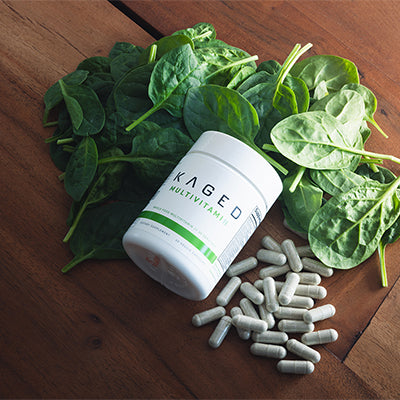There’s a popular saying that summertime bodies are made in the winter.
If you want to feel and look your best this summer, then the work begins months ahead of time. As much as we’re sold the idea of “six weeks to a summer six-pack,” sustainable progress that supports your physique and your health is built on a foundation of consistency.
This means, even during the winter, we must stay consistent with our diet and training if we want to hit our fat loss, muscle gain, and performance goals.
The Challenges of the Winter SeasonThe winter presents some unique challenges. First, there are the cultural barriers of the winter season: that time of extra sweets and celebration and late nights with family and friends.
Second, winter brings a higher likelihood of colds. This is due to a combination of factors, from less sunlight exposure, to more time spent inside. (1,2) Some research suggests that exercising in very cold environments can temporarily stunt your immune response. (3) All of this can contribute to missing time in the gym, and keep you from hitting your goals.
Third, there are simple logistics. When it’s cold outside and it’s already dark, who wants to get a workout in?
The Right Supplements Can Keep You From Falling Off The Wagon
With the right plan, and the right supplements along with that plan, you can navigate the winter to stay on pace for the spring and summer.
The 4 Best Supplements For The Winter
Here are four types of supplements you can take in the winter.
1) A Whole-Food Multivitamin

Multivitamins have gotten a bit of a bad wrap over the last few years. These critiques are, in many respects, valid, since vitamins extracted from non-whole-food sources canoften have questionable bioavailability.
Kaged Multivitamin provides you with bioavailable, whole-food sources of essential vitamins and minerals. This helps you cover your nutritional basis.
A quality multivitamin is on our short list for supplements to support immune function.
Here are a few of the key vitamins and minerals in Kaged Multivitamin that can support your overall health during the winter time.
Vitamin A (as beta-carotene)
Beta-carotene is an antioxidant carotenoid that converts to vitamin A in the body. Vitamin A plays critical roles in supporting immune function, vision, and bone formation.(4)
Vitamin A impacts the immune system by playing a role in the formation of the epithelium. Epithelial tissue lines the body's outer surface as well as its organs, making it the “first line of defense” for the body.
Vitamin A also plays a role in mucus secretion in the respiratory tract and intestines. (5) It’s a fat-soluble vitamin so one of the best ways to consume this vitamin is alongside a meal containing some naturally occurring fats.
Every serving of Kaged Multivitamin provides 100% of your daily value of vitamin A, sourced from sweet potato.
Vitamin C (as ascorbic acid)
Vitamin C is a potent antioxidant that plays a role in the synthesis of carnitine, catecholamines, and collagen. (6) Vitamin C helps protect the body from endogenous and exogenous oxidative stress. (7)
Vitamin C’s most known role is its ability to support both adaptive and innate immunity. (8) Keeping your immune system strong during the winter can help you stay consistent in the gym and maximize your overall health.
Every serving of Kaged Multivitamin contains 100% of your daily value of vitamin C from broccoli.
Vitamin D (as ergocalciferol)
Has any vitamin risen to a well-deserved fame like vitamin D?
Vitamin D is known as the “sunshine vitamin,” since we absorb it naturally from the sun. In the winter time, with shorter days and colder temperatures, we don’t get as much vitamin D naturally as we do in the summer. In fact, some estimates suggest that around 40% of Americans don't get optional levels of vitamin D. (10)
For people living in areas closer to the poles, with less sunlight during the day, Vitamin D supplementation may be especially valuable.
Every serving of Kaged Multivitamin contains 100% of your daily value of vitamin D from maitake mushrooms.
Zinc
Zinc is an essential mineral that plays a role in over 300 enzymatic reactions in the body. Zinc plays a role in DNA synthesis, immune function, and gene expression.
Immune system mediators like thymulin depend on the presence of zinc. (11) Immune system defense cells like the T-Cells depend on thymulin and zinc for their formation and maturation. All to say, zinc is a crucial piece of the immune system machinery.
During intense exercise, we can lose zinc, making it important for athletes with intense training schedules to be mindful of their zinc intake.
Every serving of Kaged Multivitamin contains 100% of your daily value of zinc from pumpkin.
Selenium
Selenium is a trace mineral that plays a role in metabolism and immune function. Selenium exerts these effects through its presence in selenoproteins.
Selenoproteins make up one of the most important groups of antioxidants, the glutathione peroxidases.
The primary function of these antioxidants is to remove reactive oxygen species that can damage DNA and cell membranes. (12)
This helps defend your cells from free radical damage.
Some of the best sources of selenium are foods that aren’t normally consumed by most Americans like organ meats, so supplementing with selenium can be a convenient way to increase your intake.
Every serving of Kaged Multivitamin contains 100% of your daily value of selenium from shiitake mushrooms and sunflower seeds.
Manganese
Manganese is a mineral that plays important roles in energy metabolism, connective tissue formation, and antioxidant function. Manganese as part of the enzyme Manganese Superoxide Dismutase (Mn SOD), functions as an antioxidant, and may protect the mitochondria from oxidation. (13) Some research also shows manganese to have a role in the immune system through intracellular communication. (14)
Every serving of Kaged Multivitamin contains 100% of your daily value of manganese from pumpkin.
2) A Testosterone Booster
The different seasons bring a variation in our hormone levels. In the winter, men tend to have lower testosterone levels than in the summer, likely due to less sunlight, which effects important “sleep hormones” like melatonin. (15)
However, not all testosterone boosters are creatine equal. Ferodrox™ is the testosterone booster that combines six carefully selected ingredients that boost testosterone levels within the normal, healthy range.*
What makes Ferodrox different?
KSM-66® Ashwagandha Extract
KSM-66 is a premium ashwagandha extract. Ashwagandha has been used for centuries as an herbal supplement. It can help maintain healthy cortisol levels.* Cortisol is often considered the body’s “stress” hormone.
When it comes to ashwagandha, much of its benefits are attributed to its alkaloid content, which is found in its roots. This is what makes KSM-66® a great choice, because it's a full root extract with a high concentration of bioactives.
LJ100® Tongkat Ali Extract
Tongkat Ali is a plant native to Malaysia and other parts of Southeast Asia.
LJ100® Tongkat Ali, or Eurycoma longifolia, is the only science-based Eurycoma longifolia extract, standardized to precise percentages of TA’s bioactive compounds. Co-discovered and researched in collaboration with MIT, LJ100 may increase the bioavailability of testosterone by lowering the amount of sex hormone binding globulin, or SHBG, and reducing the conversion of testosterone to estrogen.*
In sum, it supports a healthy testosterone environment.
This is just the surface of Ferodrox™, and you can learn more about its ingredients here.
3) Omega-3 (Fish Oil)

Omega-3s are polyunsaturated fatty acids that are commonly found in food sources like fatty fish, walnuts, and algae. We can’t make omega-3 fatty acids on our own, so we have to get them through diet or supplementation.
They’ve shown to support everything from heart health, to brain health, to joint health.* Truly, they’re one of natures “super fats.”
When looking for an omega 3 supplement, make sure you actually look at the amount of omega 3 fatty-acids.
Some fish oil supplements contain a low percentage of omega 3s. Kaged Omega 3 uses wild-caught, purified fish oil to promote healthy joints and support your heart and brain health.* We also use a full 2 grams of EPA/DHA omega-3s per serving, from high-absorption triglycerides.
4) Protein Powder
Protein, one of the 3 macronutrients, plays an important role in supporting the building and repair of muscle.
During the holiday season, yYou can use protein supplements strategically to ensure that you stay on track with your body composition goals.
Energy dense, low nutrient foods are everywhere during this time of the season, one strategy to help control your environment is to supplement with additional protein.
Research on protein consumption has shown that preload protein intake prior to a meal can lower short-term food intake and high protein diets can increase satiety and diminish nighttime cravings. (19, 20)
You can apply this to your winter time strategy by drinking a protein shake an hour or two before a big get together so you reduce your intake of other low nutrient/calorie-dense foods.
Another option is to make nighttime puddings with protein to crush late evening cravings for sweets. When it comes to the type of protein powders, they all have their benefits.
Whey protein digests fast, whereas casein protein digests slowly, making it more popular as a nighttime protein snack. For people that prefer plant proteins, a plant protein like Plantein comes with a complete essential amino acid profile suited for building muscle and enhancing recovery, and a perfected formula that tastes great and mixes easily, unlike many plant proteins.
Designed to help you build and maintain lean muscle.*
Build and Recover With a Delicious, Smooth Casein Protein*
Delicious, Smooth, Vegan Protein for Muscle Gains and Recovery*
If you want to incorporate the best supplements for winter health into your seasonal routine, a fast and practical way to do this is to stack Multivitamin, Ferodrox, Omega 3, and a Kaged protein powder of your choice.
References
(1) https://www.ncbi.nlm.nih.gov/pmc/articles/PMC5949172/
(2) https://www.ncbi.nlm.nih.gov/pmc/articles/PMC3604842/
(3) https://www.wemjournal.org/article/S1080-6032(11)00201-8/fulltext
(4) https://www.ncbi.nlm.nih.gov/pmc/articles/PMC1195969/
(5) https://www.ncbi.nlm.nih.gov/pmc/articles/PMC6162863/
(6) https://www.ncbi.nlm.nih.gov/books/NBK499877/
(7) https://www.ncbi.nlm.nih.gov/pmc/articles/PMC5707683/
(8) https://www.ncbi.nlm.nih.gov/pmc/articles/PMC5707683/
(9) https://www.frontiersin.org/articles/10.3389/fimmu.2013.00148/full
(10) https://pubmed.ncbi.nlm.nih.gov/21310306/
(11) https://www.nature.com/articles/1601479.pdf
(12) https://www.ncbi.nlm.nih.gov/pmc/articles/PMC3560698/
(13) https://www.hindawi.com/journals/er/2011/387176/
(14) https://www.sciencedirect.com/science/article/pii/S1074761318301298
(15) https://www.ncbi.nlm.nih.gov/pmc/articles/PMC5057046/
(16) https://www.ncbi.nlm.nih.gov/pmc/articles/PMC6087749/
(17) https://www.ncbi.nlm.nih.gov/pmc/articles/PMC4540034/
(18) https://www.ncbi.nlm.nih.gov/pmc/articles/PMC6683166/

